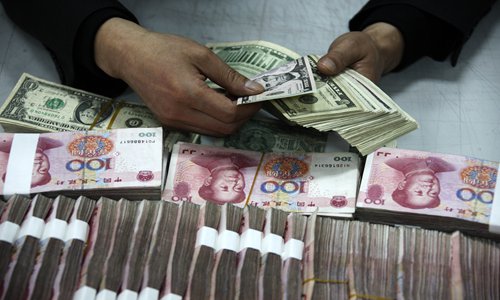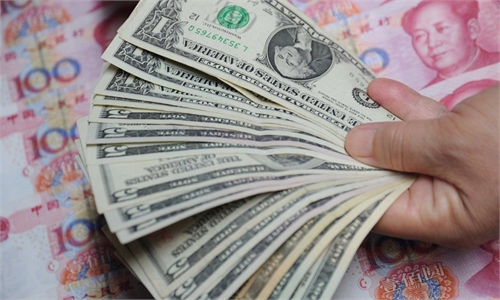Yuan softens amid unusual dollar strength, stability in sight as China's recovery gains pace: experts
Stability in sight as China's recovery gains pace: experts

A Chinese clerk counts US dollar banknotes next to yuan bills at a bank in Huaibei, East China's Anhui province. File photo: IC
The Chinese yuan further softened to around 6.92 against one US dollar on Monday, hitting a fresh two-year low, as the dollar's unusual strength amid the Federal Reserve's policy tightening prompted other major currencies to devaluate.Arguing against any overblown outlook for the Chinese currency's short-term swing, experts voiced optimism on yuan's stability in the longer run, citing expectations that Chinese economy's recovery is set to gain momentum in the coming months, buoying market sentiment over the yuan's sustained investment-worthiness.
The onshore yuan finished at 6.9210 in the spot market on Monday, a softening of 589 basis points (bps) from the previous trading session, official data showed.
The offshore yuan softened beyond 6.93 intraday on Monday. In terms of the daily fixing, the yuan was set at 6.8698 against the dollar on Monday, 212 bps weaker than the reading on Friday.
The weakening of the yuan that has accelerated since mid-August has been mainly driven by the dollar's strength amid the Fed's aggressive rate-hiking, market observers said.
The US Dollar Index currently hovers at 109, its strongest level in 20 years.
As the US central bank is to continue its monetary tightening in its attempt to tame surging inflation, the dollar has gained value in the market, dwarfing other currencies.
A softer yuan in this context still makes the Chinese currency one of the most resilient non-dollar units, experts say. For example, the euro has slid below parity with the dollar, sinking to its lowest level in two decades.
The yuan's recent softness shouldn't be overblown, Cao Heping, an economist from Peking University, told the Global Times on Monday.
The yuan has softened to around 6.92 against the dollar from about 6.37 at the beginning of the year. The fluctuation remains within the range of 6.2-7.2 logged over the past five to six years, Cao said.
"It would be quite an achievement if the yuan could stay at around 6.9 versus the dollar by year-end," he continued, hoping for the Chinese currency to return to the 6.7 level during the first quarter of 2023.
Runaway inflation in the US would chip away at the attractiveness of US assets, pushing investors away from the dollar and into other currencies over the longer run, the economist said.
Chinese yuan and other currencies are likely to gain value if investors drifted away from dollar-denominated assets in case of a failed attempt by Washington to fix inflationary woes. That suggests the economic fundamentals would be more important for global investors than short-term currency swings, Cao remarked.
China's ramped-up efforts to shore up its economy, as evidenced by the recent announcement of 19 policy measures are seen as brightening the outlook for the world's second-largest economy despite global uncertainties.
The Chinese economy is on track to regain growth momentum in the fourth quarter, according to Tan Yaling, head of the China Forex Investment Research Institute.
By comparison, the US economy will likely be challenged by deepening political woes and debt anxiety then, Tan said, in anticipation of an optimistic scenario of the yuan climbing to 6.5-6.6 versus the dollar at the year-end.
In a bylined article published by China Business News on Monday, Guan Tao, BOC International's global chief economist and a former official at the State Administration of Foreign Exchange, wrote that both the Chinese government and the market have become more tolerant of and adapted to two-way currency moves and wider swings.
"Policy tweaks could be on the cards if exchange rates overshoot", Guan said.
In April, the People's Bank of China, the central bank, announced plans to cut foreign exchange reserve requirements for financial institutions by 1 percentage points to 8 percent amid the yuan's accelerated depreciation then.
Prior to the cut that took effect in mid-May, the central bank raised the forex reserve requirement ratio twice last year. First came an increase of 2 percentage points from 5 percent in mid-June, followed by a hike from 7 percent to 9 percent in mid-December, in a move to offset the yuan's sustained strength throughout 2021.
China has the confidence, condition and capacity to keep the yuan's exchange rate basically stable at a reasonable and equilibrium level, Guan noted.
Maintaining a flexible forex policy allows for exchange rates to serve as a "damper" against internal and external shocks, increasing the macro policy independence and beefing up investor confidence, he said.


